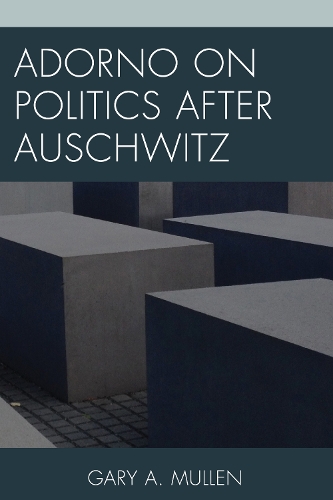
Adorno on Politics after Auschwitz
(Hardback)
Publishing Details
Adorno on Politics after Auschwitz
By (Author) Gary A. Mullen
Bloomsbury Publishing PLC
Lexington Books
30th December 2015
United States
Classifications
Tertiary Education
Non Fiction
Western philosophy from c 1800
193
Physical Properties
Hardback
146
Width 157mm, Height 239mm, Spine 15mm
345g
Description
In the minds of many critical theorists, Theodor W. Adorno epitomizes the failure of critical theory to provide any concrete guidance for political practice. His name is almost synonymous with the retreat of the progressive intellectual from the creeping totalitarianism of contemporary mass democracy. This book endeavors to disrupt this misconception by offering a close reading of Adornos philosophical confrontation with the Holocaust and the modern conceptions of history, morality and subjectivity that are complicit in genocide. By rethinking the relationship between reason and remembrance, morality and materiality, mimesis and political violence, Adornos work offers not only incisive criticism of modern political ideas and institutions, it also shows us intimations of a different political practice.
Reviews
In a way that is both broad-ranging in its treatment of themes from Adornos work and narrowly focused on exploring how they are influenced by the horrors of the Holocaust, Gary Mullens Adorno on Politics After Auschwitz reminds us that we can valuably reframe our understanding of an author by taking a familiar argument to new depths. . . . [T]hose who read this book will encounter an author who is very informed, perceptive, and knowledgeable about Adornos own writings. Mullens in-depth analysis on Adornos response to Auschwitz will help clarify and sharpen the perspective even of those scholars who are familiar in general terms with the significance of the Holocaust on his thought. * Canadian Society for Continental Philosophy *
Gary Mullen delivers a spirited defense of Adornos oft-maligned attempt to bring critical theory to bear on the history of European domination. By attending to the eschatological deep structure of Adornos philosophical project, Mullen deftly counters the popular interpretation of Adorno as a lapsed (and perhaps jaded) champion of reason and enlightenment. As portrayed by Mullen, in fact, Adorno is properly understood as calling for an intensification of the project of European enlightenment and as directing the critical power of reason toward the particularity of human suffering. As Mullen ably demonstrates, the normative power of Adornos contribution to critical theory derives from his candid confrontation with the Holocaust, which, Adorno believed, obliges us to re-think the nature and purchase of political judgment. This is an impressive, urgent, and deeply humane book.Adorno on Politics will be a valuable resource for students and scholars alike. -- Daniel Conway, Texas A&M University
Author Bio
Gary A. Mullen is assistant professor of philosophy and director of the public policy program at Gettysburg College
